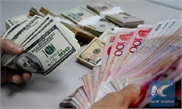
Illusration: Tang Tengfei/Global Times
Against the backdrop of US Federal Reserve's radical interest rate hikes, the Chinese yuan exchange rate has undergone some adjustment, which is quite normal. However, some Western media outlets had interpreted a mild adjustment for the yuan as the sign of unsustainable recovery in the Chinese economy. Such a misreading reflects Western elites' bias toward China.
The latest example is an article from the Financial Times, issued on Sunday under the headline "Is China's economic rebound sustainable?" Kiyong Seong, lead Asia macro strategist at French bank Societe Generale, was quoted as saying, "We had thought that stronger sentiment thanks to China's abrupt reopening and the subsequent improvement in some economic data points would strengthen the yuan," "but this has not materialized."
The offshore yuan weakened past 7 per US dollar on Wednesday for the first time in five months. On Monday, the yuan's central parity exchange rate against the US dollar stood at 7.0157. The recent depreciation of the yuan is a fact, but it should be noted that the adjustment comes against the backdrop of the US Fed's interest rate hike campaign. While the monetary policy divergence between China and the US has intensified, it is quite normal to see some volatility in the foreign exchange market.
The US Fed on May 3 approved its 10th interest rate increase in just a little over one year. It is generally believed that its latest rate hike to counter high inflation may cast a shadow on economic recovery and result in an appreciation of the US dollar, which is a byproduct of the US' irresponsible monetary policy.
China, in contrast, has kept inflation under control. The consumer price index (CPI), a main gauge of inflation, edged up 0.1 percent year-on-year in April, which could create space for the country to adopt a more flexible policy to stimulate economic growth. It is a positive signal of economic recovery, not a negative one, although there is no need to deny that the monetary policy divergence between China and the US has indeed imposed a degree of impact in the foreign exchange market.
Compared with the world's major currencies, the Chinese yuan has posted a stable performance in value against the rising US dollar, thanks to China's prudent macroeconomic policies, stable economic growth, and its long-term development potential. In 2022, when the US Fed started raising interest rates aggressively, some Southeast and South Asian economies experienced considerable devaluations of their currencies, but the yuan has remained relatively stable against a basket of currencies. Against this backdrop, the internationalization of the yuan is maintaining a steady trajectory, while a global trend toward de-dollarization has already begun. The steady internationalization of the yuan demonstrates the continued confidence of international investors in the Chinese currency and China's economic outlook.
Because of the policy uncertainty in the US, we don't need to be too concerned about some short-term fluctuation in the foreign exchange market. Of course, 7 per dollar is a kind of psychological barrier for the market and there are always a lot of discussions among market participants each time the yuan edges close to the level.
However, there's no need to read too much into or make a big fuss about some mild depreciation of the yuan. At the very least, short-term market volatility should not be used as leverage to attack the Chinese economy.
There is no basis for the long-term depreciation of the Chinese yuan. Customs data show Chinese exports grew in April by 8.5 percent to $295.4 billion compared with a year earlier, despite weakening global demand. Strong export is set to offset a buoyant dollar and the monetary policy tightening adopted by the US.
Although some Western media outlets have recently published articles saying China's economic recovery has slowed significantly, the facts showed China's economy grew by 4.5 percent in the first quarter, higher than the figures in many developed countries.
China's high-quality economic development is sustainable. Efforts to use the yuan as a leverage to attack the Chinese economy are doomed to fail.
The author is a reporter with the Global Times. bizopinion@globaltimes.com.cn



